Mark Anthony Neal's Blog, page 849
December 20, 2013
1Hood Media Presents: Davey D
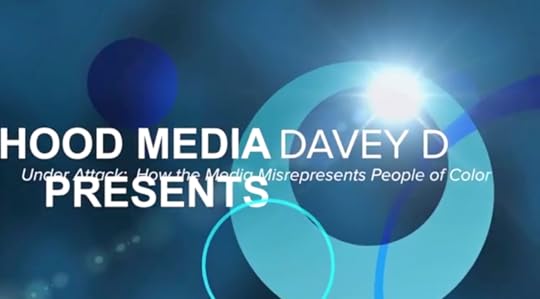 1Hood Media
1Hood MediaJournalist, adjunct professor, Hip Hop historian, syndicated talk show host, radio programmer, producer, deejay, media and community activist, Davey D served as a panelist on 1Hood Media's program Under Attack: How the Media Misrepresents People of Color. Here Davey ask what is journalism and describes his experience working in mainstream media. Footage taken by Willy PGH.
Published on December 20, 2013 09:35
"Our Hair Has a Mind of its Own": 'Cornrows'--a One Hour Docudrama (Exec. Prod.Nana Camille Yarbrough)
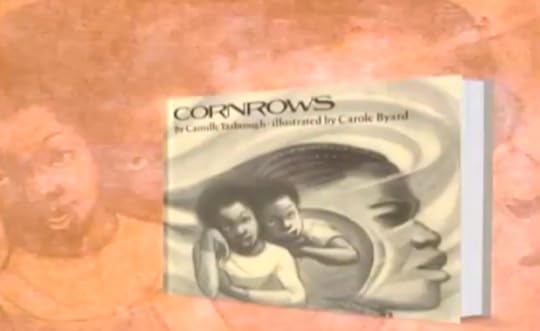 StaceyMFilms
StaceyMFilmsCORNROWS is a One Hour Docudrama, currently in production, Executive Produced by Nana Camille Yarbrough
34 years ago Nana Camille Yarbrough wrote a book called "Cornrows", a Coretta Scott King Award Winner, and today it is just as necessary and important than it was then. Cornrows is a story about our people, our culture, our family and our heritage. Now, Nana Camille Yarbrough is taking Cornrows to the big screen with the production of a one hour docudrama that takes the viewers on a journey from America to Africa, the Motherland and back again.
Published on December 20, 2013 09:24
December 19, 2013
The Hip-Hop Battle: Cultural Catalyst vs. Colonial Consumption with Brother Ali
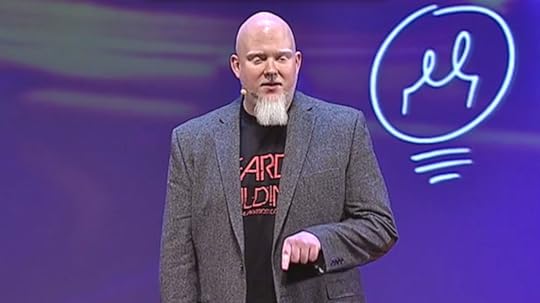 Chicago Ideas Week
Chicago Ideas WeekWe cannot pretend to love hip-hop without loving the people and the communities that brought it to the world. Ever since his first show in 1985 at his grandmother's funeral, Brother Ali has been challenging the stereotypes of hip-hop. Tune in as he strips down the flowery language of hip-hop and explores the possibilities within an evolving culture. Is hip-hop a cultural catalyst or colonial consumption?
Published on December 19, 2013 14:22
Selling ADHD: How Pharmaceuticals Played on Fears
 New York Times Video
New York Times VideoWhat makes A.D.H.D. ads so effective? Dr. Aaron Kesselheim of Brigham and Women's Hospital analyzes several ads and discusses how they play on parents' common fears about their children.
Published on December 19, 2013 04:31
December 18, 2013
Ledisi Reveals Sexy Side on New Album 'Truth'
Published on December 18, 2013 20:35
Beyoncé’s Boundaries by Emily J. Lordi
 Beyoncé’s Boundaries
by Emily J. Lordi | special to NewBlackMan (in Exile)
Beyoncé’s Boundaries
by Emily J. Lordi | special to NewBlackMan (in Exile)Debates about Beyoncé’s feminism are at heart about us: what are we to do with her? Embrace, reject, some of both? These questions help us determine where we stand on important issues. They are less helpful in illuminating what Beyoncé herself has made. Here I want to highlight the texture and richness of her new album, which abstract terms like “feminism” can obscure.
In my view, the major contribution of BEYONCÉ is that it depicts a black woman artist who has lived her life in front of cameras and who, in the spectacular way she does most things, is claiming the right to her own rich, complex imaginative landscape—one that can be just as dark and twisted and fantastic as any male artist’s, in addition to being fun and self-critical and maternal and sad. We need to attend to the details to see this.
Perhaps it should not surprise us that an album with a song called “Partition” near its center is fundamentally concerned with borders and boundaries. BEYONCÉ is about testing, respecting, and dissolving borders between different facets of the self; between sound and vision; fantasy and reality; artist and public; the bodies of lovers; mother and child; sincerity and satire; provocative rachetness and plain old bad taste.
If Beyoncé’s 2008 album I Am… Sasha Fierce bifurcated “Beyoncé” into two personae—good girl and bad diva—this album integrates myriad identities under the banner of a holistically multifaceted BEYONCÉ. As Joan Morgan might put it, this work “fucks with the grays.”
Beyoncé’s lyrical poetry blurs the edges between words. What goes up ghosts around, she sings in “Haunted,” where I’m haunting you becomes I’m onto you, just as rocket will slide into rock it and drunk in love will slur into drunken love. The slightest variation can make all the difference, as when the pageant judge in “Haunted” blunts all the flair of “Beyoncé” by dropping the last syllable of her name. This is one of the album’s many instances of naming, a device that signals the artist’s multiplicity. She is alternately identified as “Miss Third Ward,” “Yoncé,” a member of the Star Search team “Girls Tyme,” and the three identities that Blue Ivy Carter voices in the album’s last moments: Beyoncé (“Bee-sa-yay”), “Mommy,” and “Mrs. Carter.”
Individual songs likewise contain multiple identities. “Haunted” is a Boots production in two parts; slippery as a ghost, it keeps playing with time, subdividing and protracting the beat. The first and second movements of “Flawless” are divided by the partition of Chimamanda Adichie’s sampled speech on feminism. Complexity is a compositional and a performative principle here. Foregoing her usual vocal pyrotechnics, Beyoncé integrates her vocals into the overall mix.
She hews to the limited range of the Drake song and accommodates Frank Ocean’s adolescent sound. (This is a gracious move and a confident one: she knows we know what she can do.) In place of virtuosity—the “pretty” that the first song critiques—we get versatility: Beyoncé’s Vanity-6-inspired “Blow”; spare chromatic drama a la Lana del Rey in “Heaven”; a weirdly unsupported Kate Bush sound in “Blue”; subtle Caribbean stylings on “XO”; and the stunningly intricate D’Angelo tribute “Rocket.”
Which brings me to the sex. Sex is the most obvious terrain on which Beyoncé challenges boundaries between self and other: Goddammit I’m comfortable in my skin… and you’re so comfortable in my skin. If I never expected to see so much of Beyoncé’s own skin in all my life, nor do I experience her self-exposure as self-revelation. What I do find new and rather moving is her call to “all the grown women out there” in “Blow.” This is one of those rare moments in pop music where it is cool for women to be grown.
But being grown here is not only about the edgy sex. It is also about insisting on fun and eroticism in a relationship that has passed its first bloom. This is why it matters that “Drunk in Love” features Jay-Z: it allows us to interpret the song as being about a long-term married couple working to keep the spark alive. The representation of sex on this album is also grown, of course, in that it results in a child. Here is a scenario we are not accustomed to seeing: the married-with-children couple that has hot, sometimes drunken sex.
The sex can distract from the humor. Whereas we embrace the quirky oddball humor along with the eroticism of male artists like D’Angelo and Prince (and countless rappers), Beyoncé’s offbeat humor is scarcely legible as such. Hence critics debated the feminism of this year’s “Bow Down” without seeming to note its hilarity—the way the ultra-bass sound parodied masculine swagger and the accompanying photo made Beyoncé’s catty lyrics at least partly tongue-in-cheek: you better bow down to me, surrounded as I am by my dynasty of plastic trophies.
This album amplifies the screwball humor that has sounded around the edges of Beyoncé’s work ever since Destiny’s Child sang about their “automo-bills.” Witness the wacky Frank Ocean-esque repetition of the already awkward word “surfboard” in “Drunk in Love,” as well as lines like I woke up like this, you’re drivin me cray… cray, and my personal favorite: I sneezed on the beat and the beat got sicker.
If humor softens the boundaries between the star and the people, the album also engages the tension between Beyoncé’s populist conceit and her exceptional status. This tension is apparent in the video for “No Angel.” Like the musical tracks that embed her vocals in the rest of the mix, this video sets Beyoncé into a social landscape of which she is not the main focus. In place of the sex scene the lyrics describe, director @Lilinternet features Houston residents and rap icons. Beyoncé sings, underneath the pretty face is something complicated. The video makes that “something” not just the Dirty South but also the superstar’s complicated relationship to it.
If the young Beyoncé accepted her pageant crown with a shout-out to her city—“I love you Houston”—the grown Beyoncé does not interact with anyone there. At once underdressed and overdressed in lingerie and a big white fur coat, she is clearly alienated from the “home” to which this video is also a love letter.
Some of the videos are less interesting than the songs. “Drunk in Love” looks like every other sexy black-and-white beach video you’ve ever seen, except that it offers a rare glimpse of Beyoncé dancing awkwardly—a fact for which she vigorously compensates in the next video by dancing fiercely while wearing roller skates. But in general the videos complicate and enrich the already multidimensional music. A wholly unexpected riot in “Superpower” turns Obama’s “yes we can” campaign slogan into the rallying cry of dystopic rebellion.
The video for “Partition” frames the hot sex as the daydream of a woman whose partner won’t even acknowledge her across the breakfast table. After all the wet of waterfalls, ocean, liquor, arousal, “Mine” documents a dry season of fire, sand and clay. Through images of burning and lovers’ identity-erasing white hoods, the video asks where we draw the line between claiming and enslaving each other. The video for “XO,” the best song Arcade Fire never recorded, makes the anthem even more irresistible: here a fully-clothed Beyoncé romps through Coney Island, finally having uncomplicated fun with others.
She explores another environment in “Blue,” a video with a nostalgic, Instagram aesthetic set in Brazil. Despite the title, Beyoncé’s own child is not the focus but is rather the catalyst for Beyoncé’s appreciation of the wider world. When I look in your eyes, I feel alive. Blue opens her mother to newness: to learning new dances from kids and humbly practicing them in public (in a gesture that also authenticates her dance moves as coming “straight from the source”).
Beginning with a mother’s oppressive advice to her daughter and ending with the word “Blue,” BEYONCÉtests the bonds and boundaries between parents and their children. The last song extends a matrilineage and hopes to break a pattern.
Sexuality is an important and compelling part of all this, but when we fixate on the sex we replicate the very problem this album is designed to expose: that it is still so hard for a black woman artist to be seen as deeply sexual and as a range of other things—intellectual, creative, maternal, virtuosic, self-critical, egotistical, and hilarious. When Beyoncé claims all this brilliant complexity she issues a challenge that is also a gift, whether you want to call it feminist or not.
***
Emily J. Lordi is an assistant professor of English at the University of Massachusetts, Amherst and the author of the just published Black Resonance: Iconic Women Singers and African American Literature (Rutgers UP, 2013). Her music and film reviews have appeared in New Black Man (in Exile), The Feminist Wire, and The New Inquiry. She is working on a new book on soul.
Published on December 18, 2013 15:12
Tell Me More: Why Black College Football Players Fall Behind In Education
Published on December 18, 2013 13:22
Left of Black S4:E13: The New Negro Renaissance Beyond Harlem & Shifting the Lens on Race
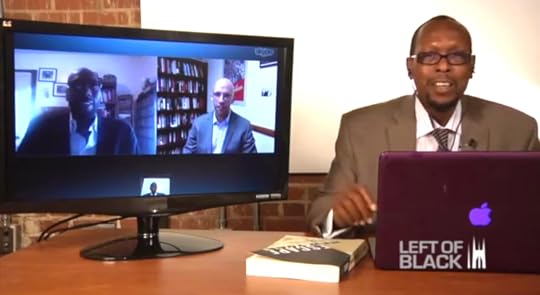 Left of Black S4:E13: The New Negro Renaissance Beyond Harlem & Shifting the Lens on Race
Left of Black S4:E13: The New Negro Renaissance Beyond Harlem & Shifting the Lens on RaceLeft of Black host and Duke University Professor Mark Anthony Neal is joined via Skype by historians Davarian Baldwin (Trinity College) and Minkah Makalani (University of Texas) for a discussion of their new co-edited volume Escape from New York: The New Negro Renaissance Beyond Harlem .
Later Neal is joined, via Skype, by Professor Yaba Blay, to talk about her new book (1)ne Drop: Shifting the Lens on Race . Blay is co-director of the Africana Studies program at Drexel University.
Left of Black is a weekly Webcast hosted by Mark Anthony Neal and produced in collaboration with the John Hope Franklin Center at Duke University.
*** Episodes of Left of Black are also available for free download in @ iTunes U
***
Follow Left of Black on Twitter: @leftofblackFollow Mark Anthony Neal on Twitter: @NewBlackManFollow Yaba Blay on Twitter: @FiyaWata
Follow Minkah Makalani on Twitter: @MinkahM
Published on December 18, 2013 09:09
Black Folk Don't: "Do Plastic Surgery"
 Black Folk Don't
Black Folk Don'tSome say that "black don't crack" but does that mean that Black folk don't have plastic surgery? Watch this episode to find out if this is true!
Published on December 18, 2013 08:21
December 17, 2013
Poet Nikki Giovanni Reads From Her New Book, "Chasing Utopia"
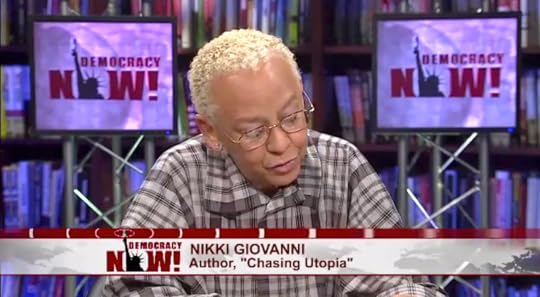 Democracy Now
Democracy NowWe speak with award-winning poet, activist and educator Nikki Giovanni. She is currently a distinguished professor of English at Virginia Tech. In 1968, 45 years ago, she published her first collection of poetry, "Black Feeling Black Talk." She was soon dubbed the "Princess of Black Poetry." She has since published more than 30 books. Her latest is Chasing Utopia: A Hybrid , a remarkable mix of poetry, essays and memoir. She was the first recipient of the Rosa L. Parks Woman of Courage Award, and she has also been awarded the Langston Hughes Medal for poetry. Hear Giovanni read two poems from the book: "The Significance of Poetry" and "Spices."
Published on December 17, 2013 15:55
Mark Anthony Neal's Blog
- Mark Anthony Neal's profile
- 30 followers
Mark Anthony Neal isn't a Goodreads Author
(yet),
but they
do have a blog,
so here are some recent posts imported from
their feed.





